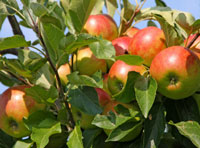Soil & Sea: reports from our producers
This article was originally published in September 2012

Washington state apples generally are considered the world’s best, most consistently. But local orchardists are facing competition now from growers in China, South America and Europe.
The blackberry industry faces labor problems, mainly the shortage of labor and the cost. Oregon blackberry growers also face infestations of spotted wing drosophila (fruit flies) amidst dwindling research budgets from the U.S. Department of Agriculture.
Two shipments of fresh non-organic blueberries from California were held up by Japanese importers for testing too high in pesticide residues. The Japanese ministry agreed to count the two shipments from one grower as a single violation, to head off increased testing of future imports.
Small amounts of quinoa are being grown across the Pacific Northwest. About a dozen Washington and Oregon farmers are trying to grow the grain native to Bolivia because there’s a lot of interest in using quinoa in cereals and pastas.
The number of loans to young, beginning and small farmers by the Farm Credit system network of lenders has declined. Loan activity was strong from 2001 to 2008, then leveled off for a few years, then decreased in 2011. Analysts say the number of loans may be affected by farmers’ abilities to make payments and by the trend toward fewer, larger farms, which reduces the number of loan applicants.
Alaska’s wild salmon harvest for the 2012 season was 71 million fish as of August, well below the projection of 132 million fish. Catches of the popular sockeye species weren’t significantly lower than they were last year, but catches of pink salmon reportedly were. Over all, Alaska salmon catches were predicted to be 25 percent less than they were in 2011.
